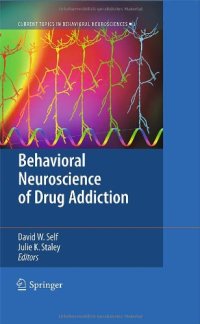
Ebook: Behavioral Neuroscience of Drug Addiction
Author: Garret D. Stuber F. Woodward Hopf Kay M. Tye (auth.) David W. Self Julie K. Staley Gottschalk (eds.)
- Genre: Medicine // Neurology
- Tags: Neurosciences, Neurochemistry, Pharmacology/Toxicology, Psychiatry, Psychopharmacology, Imaging / Radiology
- Series: Current Topics in Behavioral Neurosciences 3
- Year: 2010
- Publisher: Springer-Verlag Berlin Heidelberg
- Edition: 1
- Language: English
- pdf
Drug addiction is a chronically relapsing mental illness involving severe motivational disturbances and loss of behavioral control leading to personal dev- tation. The disorder af?icts millions of people, often co-occurring with other mental illnesses with enormous social and economic costs to society. Several decades of research have established that drugs of abuse hijack the brain’s natural reward substrates, and that chronic drug use causes aberrant alterations in these rewa- processing systems. Such aberrations may be demonstrated at the cellular, neu- transmitter, and regional levels of information processing using either animal models or neuroimaging in humans following chronic drug exposure. Behaviorally, these neural aberrations manifest as exaggerated, altered or dysfunctional expr- sion of learned behavioral responses related to the pursuit of drug rewards, or to environmental factors that precipitate craving and relapse during periods of drug withdrawal. Current research efforts are aimed at understanding the associative and causal relationships between these neurobiological and behavioral events, such that treatment options will ultimately employ therapeutic amelioration of neural de?cits and restoration of normal brain processing to promote efforts to abstain from further drug use. The Behavioral Neuroscience of Drug Addiction, part of the Springer series on Current Topics in Behavioral Neurosciences, contains scholarly reviews by noted experts on multiple topics from both basic and clinical neuroscience ?elds.
This volume highlights current state-of-the-art approaches and important findings on the behavioral neurobiology of drug addiction by prominent neuroscientists. Preclinical chapters span synaptic neuroplasticity associated with drug use, the neural systems underlying conditioned drug effects implicated in drug craving, and the role of sensitization and withdrawal processes in addictive behavior. Chapters on human studies emphasize neuroimaging of neurotransmitters and receptors, drug craving and other cognitive abnormalities in human drug abusers. Human studies also describe work on genetic vulnerability and the neuroeconomics of drug addiction, and novel pharmacological approaches to drug abuse treatment.